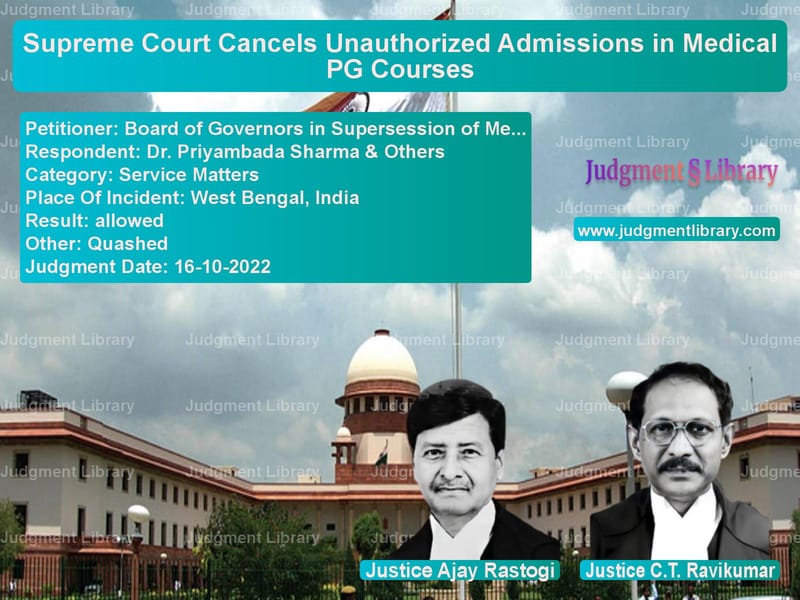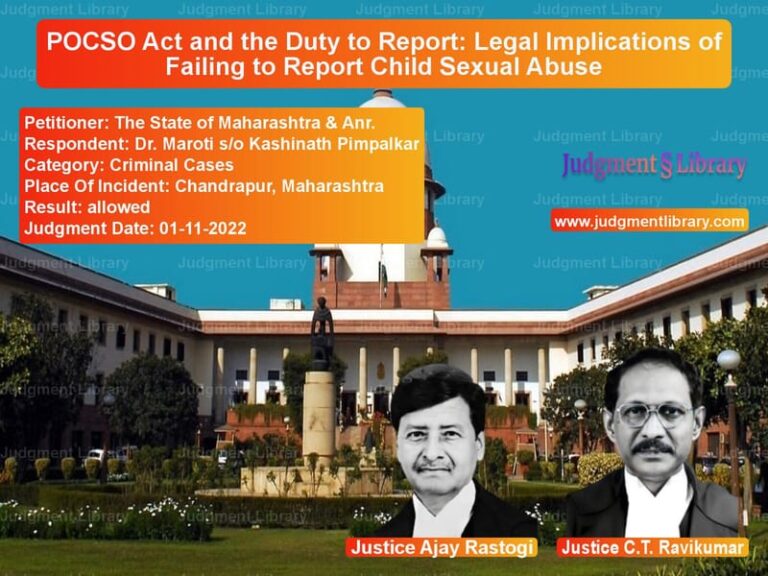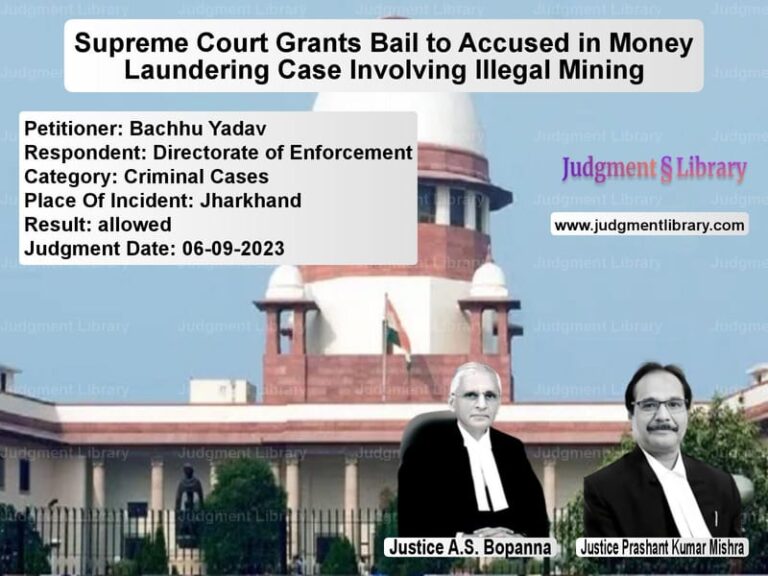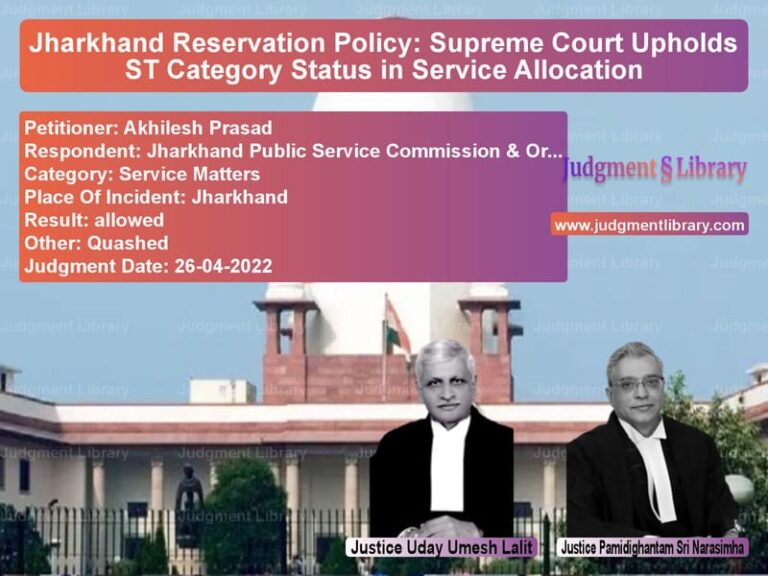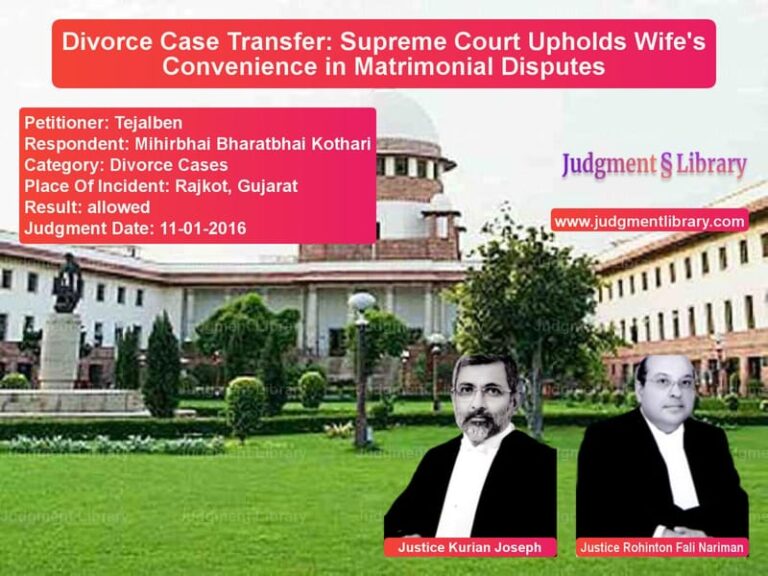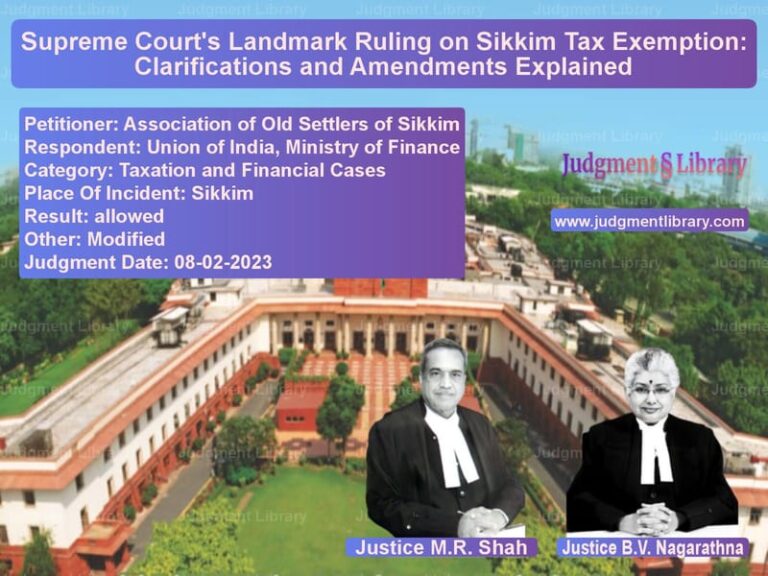Supreme Court Cancels Unauthorized Admissions in Medical PG Courses
The Supreme Court of India recently delivered a significant judgment in the case of Board of Governors in Supersession of Medical Council of India vs. Dr. Priyambada Sharma & Others. The case revolved around the unauthorized admissions granted by the High Court of Calcutta to postgraduate medical students beyond the cutoff date, in violation of established regulations.
Background of the Case
The dispute originated when several MBBS graduates who appeared for the NEET-PG 2019 examination sought admission in postgraduate medical courses under the State quota in West Bengal. Despite failing to secure seats in the final round of counseling due to their lower merit rank, these candidates approached the Calcutta High Court, which granted them provisional admissions beyond the deadline.
The Board of Governors of the Medical Council of India (now the National Medical Commission) challenged the High Court’s decision, arguing that it violated the time-bound admission schedule established under the Postgraduate Medical Education Regulations, 2000. The Supreme Court reviewed the case and ruled in favor of the regulatory authority, holding that the High Court had erred in allowing admissions beyond the prescribed cutoff date.
Arguments by the Petitioner (Board of Governors of Medical Council of India)
The Board of Governors, representing the medical regulatory authority, presented the following arguments:
- The admission schedule for postgraduate medical courses, as per the Medical Council of India regulations, must be strictly followed, with May 31 being the final cutoff date for all admissions.
- Allowing admissions beyond the deadline disrupts the academic calendar and compromises the merit-based selection process.
- The Calcutta High Court’s decision to permit provisional admissions without considering merit was illegal and set a dangerous precedent.
- The Supreme Court has consistently upheld the sanctity of the admission schedule, as seen in past cases like Mridul Dhar vs. Union of India and Priya Gupta vs. State of Chhattisgarh.
- Merely because some seats remained vacant, it did not justify granting admissions beyond the cutoff date.
Arguments by the Respondents (Students and Colleges)
The students and medical colleges countered with the following arguments:
- Their failure to secure seats in the final round of counseling was due to administrative delays, not their lack of merit.
- Since vacant seats were available, the High Court was justified in allowing provisional admissions to ensure that medical seats did not go to waste.
- They had already completed a significant portion of their coursework and should not be forced to drop out.
- Canceling their admissions at this stage would be unfair and cause irreparable harm to their careers.
Supreme Court’s Observations
The Supreme Court, after a thorough review, made the following critical observations:
- The admission deadline of May 31 must be strictly adhered to, and no court or authority has the power to extend it.
- Permitting admissions beyond the deadline, even on compassionate grounds, would violate statutory regulations and compromise academic discipline.
- Merit-based selection is the cornerstone of medical education, and any deviation from it undermines the integrity of the admission process.
- The High Court’s ruling ignored the merit rankings of candidates and granted admissions arbitrarily.
- The Supreme Court has consistently rejected similar attempts to extend admission deadlines in past rulings.
Final Judgment
The Supreme Court overturned the High Court’s decision and ruled in favor of the Board of Governors. The Court held:
“No sympathy can be shown to students who have secured admissions beyond the cutoff date in violation of established regulations. Such admissions, being illegal, cannot be permitted to continue.”
The Court further ruled that:
- All admissions granted by the High Court beyond May 31 were to be canceled.
- Students who had been admitted illegally could not be allowed to continue their courses.
- The judgment reinforced that medical education regulations must be followed strictly to ensure fairness and transparency.
Implications of the Judgment
This ruling sets a crucial precedent for medical admissions in India:
- The integrity of the medical education admission process has been reaffirmed.
- Colleges and universities cannot admit students beyond the officially prescribed deadlines.
- Students must secure admissions based strictly on merit and within the stipulated time frame.
- The ruling serves as a warning against judicial overreach in matters of regulatory compliance.
The Supreme Court’s decision ensures that fairness and meritocracy remain at the core of medical education in India.
Petitioner Name: Board of Governors in Supersession of Medical Council of India.Respondent Name: Dr. Priyambada Sharma & Others.Judgment By: Justice Ajay Rastogi, Justice C.T. Ravikumar.Place Of Incident: West Bengal, India.Judgment Date: 16-10-2022.
Don’t miss out on the full details! Download the complete judgment in PDF format below and gain valuable insights instantly!
Download Judgment: board-of-governors-i-vs-dr.-priyambada-sharm-supreme-court-of-india-judgment-dated-16-10-2022.pdf
Directly Download Judgment: Directly download this Judgment
See all petitions in Education Related Cases
See all petitions in Recruitment Policies
See all petitions in Public Sector Employees
See all petitions in Termination Cases
See all petitions in Judgment by Ajay Rastogi
See all petitions in Judgment by C.T. Ravikumar
See all petitions in allowed
See all petitions in Quashed
See all petitions in supreme court of India judgments October 2022
See all petitions in 2022 judgments
See all posts in Service Matters Category
See all allowed petitions in Service Matters Category
See all Dismissed petitions in Service Matters Category
See all partially allowed petitions in Service Matters Category

